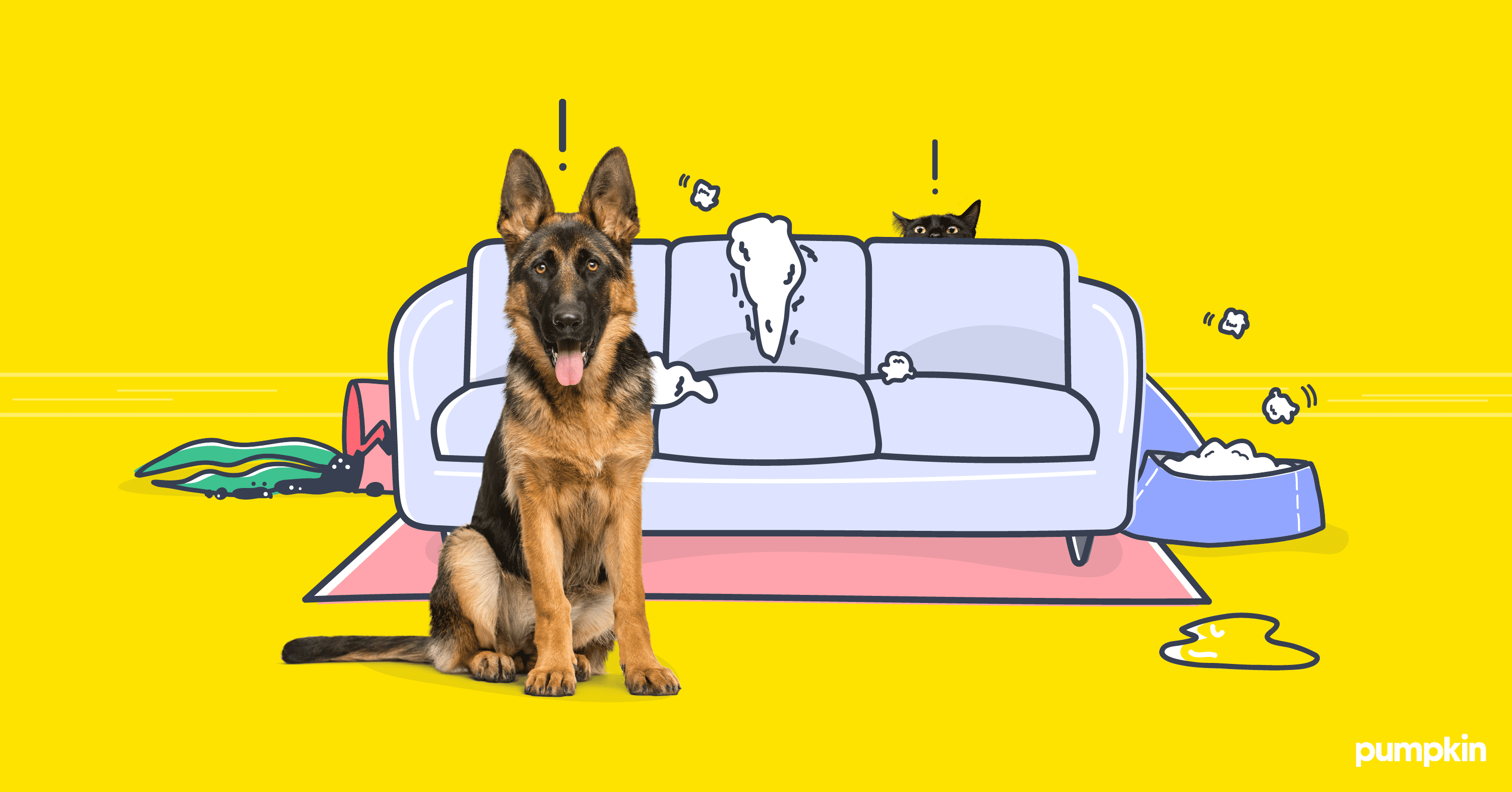Key Points
- Pet insurance can cover behavioral issues, depending on the plan.
- Some insurance plans cover behavioral issues as part of their base plan, while others include it as add-on coverage for an additional fee.
- Examples of behavioral issues that may be eligible for pet insurance coverage include excessive chewing and licking, separation anxiety, or aggression.
- Some insurance plans won’t cover behavioral issues at all and note that in their policy.
As pet parents, we can encourage the behaviors we want in our pets through training, a regular routine, and positive reinforcement. However, there are some behaviors that no amount of behavioral training can fix. This is because many behavioral issues develop for medical reasons, and you may need to seek veterinary help to fix them.
Let’s break down when pet insurance may cover behavioral issues and help you find the right plan for your pet.
Why do I need pet insurance coverage for behavioral issues?
While some behavioral issues can be corrected at home, or with the help of a trainer, there are many that need the intervention of a veterinarian or veterinary behaviorist to fully treat. In these cases, having pet insurance coverage to treat common behavioral issues can prove to be very valuable.
Tip: A Pumpkin Pet Insurance plan can help you get up to 90% of eligible vet bills covered, including eligible expenses for behavioral diagnostics and treatment.
Are behavioral issues considered accidents or illnesses?
The short answer is – it depends! Different pet insurance providers will define behavioral issues in different ways, so be sure to read the definitions in your policy document closely.
In Pumpkin plans, behavioral issues are defined as “an illness condition, either social or medical, that results from your pet’s action, inaction, or temperament that is abnormal, dysfunctional, or unusual.” Some common examples of such conditions include (but are not limited to) aggression, dietary indiscretion, excessive chewing or licking, or separation anxiety.
What are common behavioral problems and issues in dogs?
These are some common behavioral problems that dog parents may face with their pups at any age. It’s important to note that not all behavioral problems need veterinary intervention, but if you’re at your wit’s end, it never hurts to ask for help.
Separation anxiety
If your pup struggles to be left alone, and when they are alone they demonstrate uncharacteristic behaviors, it could be a sign of separation anxiety. When separated from you, pups with separation anxiety can be stressed out and panicked, causing them to bark and whine, engage in destructive chewing or digging, or urinate/defecate inside the home despite being potty trained.
Aggression
Aggressive behavior in dogs can be defined as overly protective or defensive behaviors in dogs. Aggression can present itself as a variety of different behaviors, including things like growling and snarling, lunging, biting and nipping of varying degrees, and snapping. Dog aggression can manifest as a result of prior trauma, lack of socialization, or fear of stimuli in their environment.
Fears and phobias
Just like humans, dogs can develop fears and phobias. Loud, disruptive noises like fireworks are a common trigger for some dogs, and this type of fear is called noise aversion. Intense environments with heavy crowds may also be difficult for your pup to cope with. A fear or phobia will show in your dog in behaviors like cowering, whining, pacing, barking, shaking, and many others.
What are common behavioral problems and issues in cats?
These are some common behavioral problems that cat owners may face with their kitties at any age. Again, not all behavioral problems need veterinary intervention, but it’s always good to consult with your vet if you suspect something deeper is going on.
Excessive or compulsive licking
We know that cats lick themselves as part of their hygiene routine, but that licking can cross over into the compulsive or excessive licking category as a result of pain, stress, or anxiety in your cat. In severe cases, a cat will lick sections of their body until hair is lost, resulting in bald patches.
Urine marking
Changes in your cat’s urination habits can be cause for concern, as the root cause may be a medical issue like an infection, inflammation, bladder stone, or a tumor. It can also be related to stress and anxiety, for which your vet may recommend prescription medications to help.
Aggression
Any cat parent knows that all cats have their moods, and playtime with a cat can sometimes be a little bit rough and tumble. However, signs of aggression like attacks, hissing, crouching, or other threatening behaviors are cause for concern. Cats can become aggressive when they are anxious, stressed, or frightened, and a veterinarian can help you get to the bottom of it.
What kinds of behavioral issues can some pet insurance plans cover?
An illness condition, either social or medical, that results from your pet’s action, inaction, or
temperament that is abnormal, dysfunctional, or unusual, may be covered by pet insurance. These issues may include but are not limited to:
- Aggression
- Dietary indiscretion
- Excessive chewing or licking
- Separation anxiety
- Fearful & phobic behaviors
Keep in mind that pet insurance policies often have exclusions, so certain behavioral conditions may be listed as exclusions depending on the plan. Almost all pet insurance plans exclude coverage for pre-existing conditions. A pre-existing condition is an illness or injury that occurred before your pet insurance plan coverage started or during a waiting period. This can also include symptoms of illnesses or injuries. If your pet has a behavioral issue that is pre-existing, this unfortunately would most likely not be covered.
What’s the difference between a trainer and a veterinary behaviorist?
Most dog parents will seek help from a trainer to help their dog master obedience training. This includes basic commands like sit, stay, and roll over as well as skills such as leash walking to help dogs explore their world safely. Trainers can also teach more specific skills like agility and recall.
A veterinary behaviorist or more specifically a Certified Applied Animal Behaviorist (CAAB) is an experienced and qualified individual who can help you understand abnormal behaviors in your pet and how you can address them. When you take your pet to the vet for a behavioral issue, your vet may refer you to a CAAB for a consultation. Your veterinarian and the CAAB can then work together to diagnose the issue and design a treatment plan for your pet. You can read more about the role of CAABs here.
How much does pet insurance cost if it includes behavioral issue coverage?
Some pet insurance plans, like Pumpkin plans, include behavioral issue coverage as a standard benefit in their plans. However, some pet insurance providers only offer this coverage for an additional fee on top of your standard plan. That additional fee and total plan pricing will vary depending on the provider you choose.
To see how much a Pumpkin plan costs, you can get a free quote here!
Which is the best pet insurance for behavioral issue coverage?
All pet parents should do their research on different providers and plans to find the best pet insurance for their needs. If you want to compare the behavioral issue coverage of different pet insurance plans, check out our handy compare page.
How do I get reimbursed for eligible treatment for behavioral issues?
If you have pet insurance, the process for reimbursement is fairly straight-forward. It typically goes as follows:
- You would pay for treatment as you normally would at your vet.
- You can then use your invoice to submit a claim for reimbursement to your provider.
- If your provider approves your claim, you will receive reimbursement for your eligible vet bill.
What kinds of accident & illness coverage do Pumpkin plans offer besides behavioral issues?
Pumpkin plans offer all pet parents best-in-class accident & illness coverage including:
- Diagnostics, treatment, and Rx medication for covered conditions
- Emergency care, surgery, and hospitalization for covered conditions
- Accident and illness vet visit exam fees
- Congenital conditions
- Chronic conditions
- Hereditary conditions like hip dysplasia
- Dental illnesses
- Alternative therapies (like acupuncture and physical therapy) for covered conditions
Plus, here are more amazing ways that Pumpkin plans help you get your pet the best care:
- All pets 8 weeks & up are eligible for enrollment
- Pumpkin plans offer flexible annual deductible options
- Pumpkin plans have 3 annual coverage limit options (including an unlimited annual limit)
- You can see any licensed veterinarian in the U.S. or CAN
- Our best-in-show customer care team is always ready to help you out
Pumpkin also offers a unique preventive care package called Preventive Essentials to help you give your pet the wellness care they need to stay healthy all year round. It’s not insurance, but an optional wellness package you can add to your Pumpkin plan to get reimbursed for crucial routine care like key vaccine(s), select parasite screening test(s), and your pet’s annual wellness exam fee.
Take the first step towards protecting your pet from future accidents & illnesses by fetching your free quote today!
DISCLOSURE




